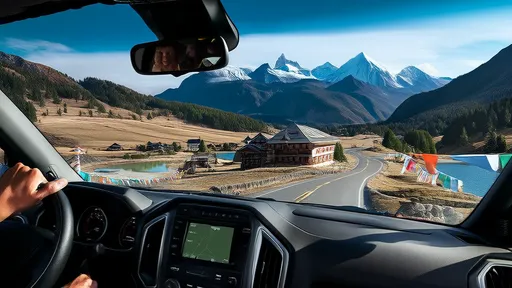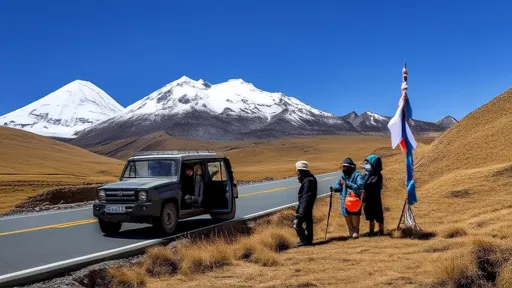As the golden rays of sunset cast long shadows across the serene landscape, there is a unique sense of freedom that comes with waking up to a different view each morning. This is the magic of RV travel, a growing phenomenon in China that combines the thrill of exploration with the comforts of home. The rumble of the engine becomes a lullaby, and the open road transforms into an ever-changing tapestry of experiences. More Chinese travelers are now embracing this nomadic lifestyle, trading hotel reservations for spontaneous detours and standardized itineraries for authentic encounters with nature and local cultures.
The recent surge in domestic RV travel represents a fundamental shift in how Chinese tourists approach vacationing. No longer satisfied with crowded tourist spots and rigid schedules, urban dwellers are seeking deeper connections with China's diverse landscapes—from the misty mountains of Guilin to the vast grasslands of Inner Mongolia. The RV serves as both transportation and accommodation, a self-contained universe on wheels that empowers travelers to discover hidden gems beyond conventional travel routes. This movement isn't just about vacationing differently; it's about reclaiming autonomy over one's travel experience and creating memories that are truly personal and unscripted.
Understanding China's RV Landscape
China's RV infrastructure has evolved dramatically from just a few years ago when options were limited and facilities basic. Today, the country boasts over 500 registered RV campsites with varying levels of amenities, spread across all provinces and catering to different types of travelers. The eastern coastal regions, particularly Jiangsu and Zhejiang provinces, feature some of the most developed campgrounds with full hookups, recreational facilities, and proximity to popular attractions. Meanwhile, western regions like Sichuan and Yunnan offer more rustic experiences amidst breathtaking natural scenery, appealing to adventurers willing to trade some comforts for unparalleled views.
The variety of RV models available for rent has similarly expanded. Local rental companies now offer everything from compact campervans suitable for couples to massive 8-berth vehicles for extended families. International brands have established partnerships with Chinese companies, bringing global standards of quality and safety to the market. Most rental vehicles come equipped with essential amenities including kitchen facilities, bathrooms, air conditioning, and increasingly, solar panels for off-grid capability. The average rental cost ranges from 800 to 2,500 RMB per day depending on vehicle size, season, and rental duration, with significant discounts available for weekly or monthly rentals.
Selecting Your Perfect RV
Choosing the right recreational vehicle requires careful consideration of your travel style and group composition. Compact Class B motorhomes, typically built on van chassis, offer excellent fuel efficiency and easier maneuverability on China's sometimes narrow rural roads—perfect for couples or solo travelers. Class C motorhomes, recognizable by their over-cab sleeping areas, provide more space and amenities suitable for families of four. For larger groups or those seeking maximum comfort, Class A motorhomes deliver residential-style living with multiple slide-out sections that expand the interior space when parked.
Beyond size categories, prospective renters should pay attention to practical considerations. Freshwater capacity determines how long you can stay self-sufficient between campground visits, while battery and power systems affect what appliances you can run off-grid. Four-wheel-drive capabilities might be necessary for exploring remote regions, though most well-established campgrounds are accessible with two-wheel drive. Modern conveniences like built-in navigation systems, rearview cameras, and WiFi boosters can significantly enhance the travel experience, especially for first-time RVers navigating China's diverse road conditions.
Navigating China's RV Campground Network
China's campgrounds vary from luxurious resorts with swimming pools and entertainment complexes to basic sites offering little more than a leveled parking spot and access to freshwater. High-end campgrounds typically feature full hookups (water, electricity, sewage), clean shower facilities, laundry services, grocery stores, and organized activities. Many are strategically located near national parks or cultural sites, serving as ideal bases for exploration. Mid-range options might lack some amenities but often compensate with better natural settings and more reasonable prices around 100-200 RMB per night.
For those seeking truly authentic experiences, numerous farm stays and vineyard properties now welcome RV visitors, providing unique opportunities to engage with rural communities and sample local produce. Dispersed camping—parking outside designated campgrounds—remains technically illegal in most parts of China, though enforcement varies by region. Some scenic areas tolerate overnight parking in specific lots, but travelers should always seek permission from local authorities or property owners to avoid complications. Digital resources including specialized apps and WeChat groups have become invaluable for finding these less formal opportunities and sharing real-time information about road conditions and site availability.
Mastering the Practicalities of RV Travel in China
Driving an RV through China presents unique challenges that require preparation and adaptability. While major highways are generally well-maintained and spacious, rural roads can be narrow and poorly signed. Toll fees for vehicles over certain height or weight classifications can be significantly higher than for passenger cars, impacting travel budgets. Parking in urban areas remains particularly difficult, with most city centers restricting large vehicles. Smart travelers plan their itineraries to explore cities using public transportation from campgrounds or suburban parking areas rather than attempting to navigate congested urban streets in their RVs.
The legal framework for RV travel continues to develop, with regulations varying between provinces and sometimes even between counties. All drivers must carry Chinese驾驶执照 (driver's license) appropriate for the vehicle's weight classification—most rental RVs require at least a C1 license. International driving permits are not recognized in mainland China. Travelers should keep physical copies of all documentation including rental agreements, insurance papers, and passports, as police checks are common. Perhaps most importantly, foreign visitors should note that only certain rental companies accept international bookings, and advance planning is essential for securing the necessary permits for travel in Tibet and other sensitive border regions.
Cultural Considerations and Sustainable Practices
RV travel in China offers incredible opportunities for cultural exchange, but it also carries responsibility. Many campgrounds are located near rural communities where residents may be unaccustomed to seeing recreational vehicles. Travelers should be mindful of local customs, dress modestly when away from tourist areas, and always ask permission before photographing people or private property. The concept of "leave no trace" remains less established in China than in Western countries, making it especially important for RV travelers to model environmentally responsible behavior by properly disposing of waste, conserving water, and minimizing generator use.
The growing RV community in China has developed its own etiquette norms that blend international standards with local customs. Arriving at campgrounds before dark is strongly advised, as many have limited lighting and staff may not be available to assist with after-hours parking. Noise levels are generally kept lower than at Western campgrounds, reflecting cultural preferences for tranquility. Socializing often occurs through shared meals rather than loud gatherings, creating opportunities for meaningful connections with fellow travelers. Many Chinese campers enthusiastically share local specialties and travel tips, enriching the experience for everyone.
Seasonal Strategies for Memorable Adventures
China's vast territory encompasses multiple climate zones, making timing crucial for enjoyable RV adventures. Spring (April-May) and autumn (September-October) offer the most comfortable conditions across most regions, with mild temperatures and generally clear skies. Summer travel requires heading to higher elevations to escape the heat and humidity of eastern cities, while winter opens opportunities for experiencing China's northern regions transformed by snow—though this requires vehicles equipped with adequate heating systems and possibly winter tires. Typhoon season (July-September) affects coastal areas, particularly in southern China, requiring flexible plans and careful weather monitoring.
Major Chinese holidays including Spring Festival and National Day week (October 1-7) present both opportunities and challenges. While special events and vibrant atmospheres characterize this period, campgrounds become extremely crowded, often requiring reservations months in advance. Roads experience heavy congestion, and popular attractions reach capacity. Savvy travelers either embrace the festive chaos with careful planning or schedule their trips during shoulder seasons when prices are lower, crowds are thinner, and the pace of travel becomes more relaxed. Some of the most rewarding experiences come from visiting destinations slightly outside peak season, when local communities have more time to interact with visitors.
The romance of the open road beckons with promises of freedom and discovery, and China's developing RV infrastructure now makes answering that call more accessible than ever. From the practical considerations of vehicle selection and campground navigation to the deeper rewards of cultural immersion and personal growth, RV travel offers a uniquely personal way to experience China's incredible diversity. Each journey becomes not just a vacation but a story in the making, written in miles traveled and memories created. As the sun rises on another day of adventure, the road awaits—where it leads is limited only by imagination and the turning of the wheels.

By /Aug 22, 2025

By /Aug 22, 2025

By /Aug 22, 2025

By /Aug 22, 2025

By /Aug 22, 2025

By /Aug 22, 2025

By /Aug 22, 2025

By /Aug 22, 2025

By /Aug 22, 2025

By /Aug 22, 2025

By /Aug 22, 2025

By /Aug 22, 2025

By /Aug 22, 2025

By /Aug 22, 2025

By /Aug 22, 2025

By /Aug 22, 2025

By /Aug 22, 2025

By /Aug 22, 2025

By /Aug 22, 2025

By /Aug 22, 2025